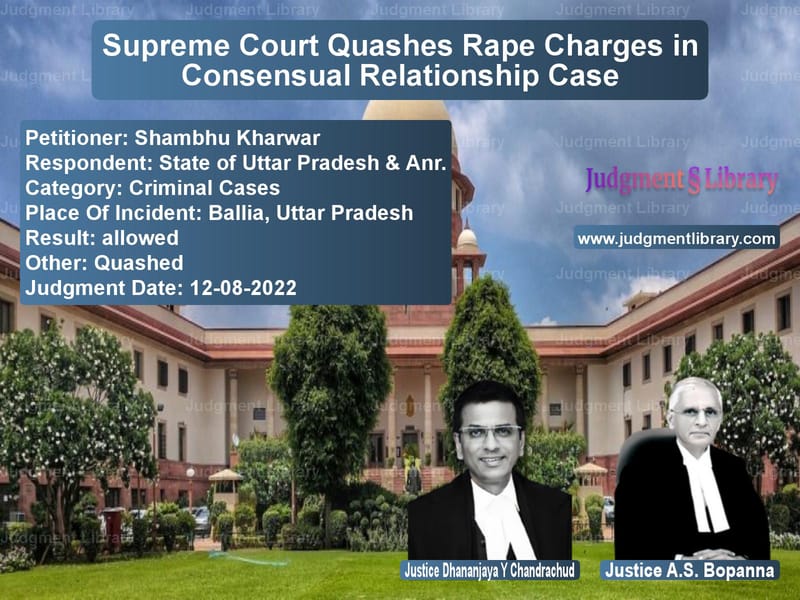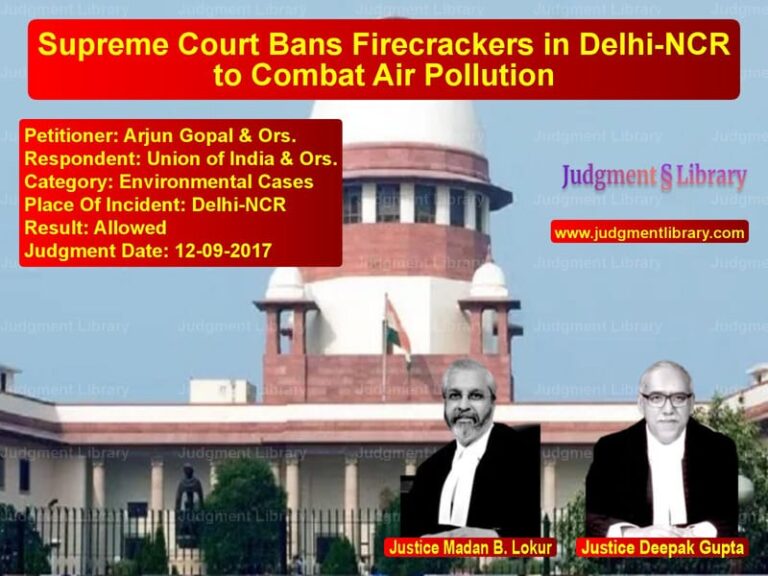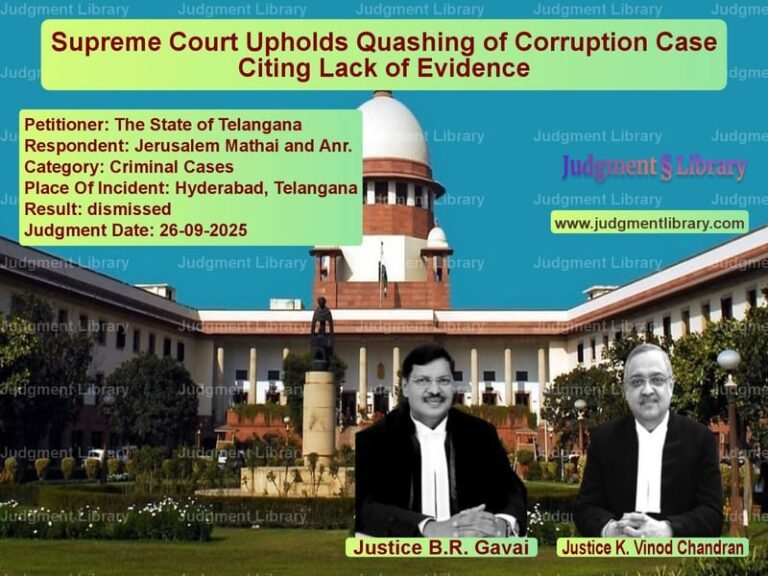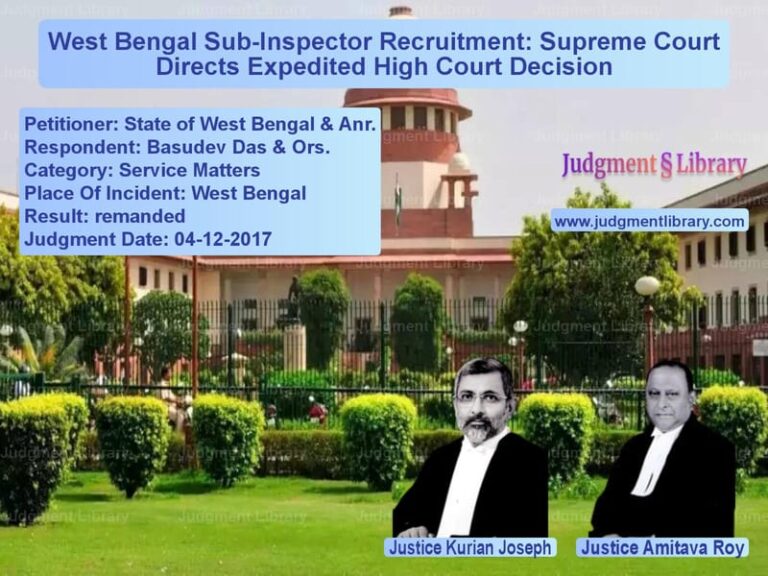Supreme Court Quashes Rape Charges in Consensual Relationship Case
The Supreme Court of India, in Shambhu Kharwar v. State of Uttar Pradesh & Anr., delivered a crucial judgment concerning allegations of rape based on false promises of marriage. The Court quashed the criminal proceedings against the appellant, reaffirming that a consensual relationship cannot be retrospectively termed as rape merely because marriage did not materialize.
Background of the Case
The case originated from a First Information Report (FIR) filed on January 18, 2018, at Police Station Rasra, District Ballia, Uttar Pradesh. The complainant (second respondent) alleged that she was in a relationship with the appellant, Shambhu Kharwar, for over three years. She claimed that the appellant had assured her of marriage and engaged in a sexual relationship with her. However, she later discovered that the appellant had secretly gotten engaged to another woman on December 10, 2017.
The complainant stated that upon confrontation, the appellant assured her that he would break off his engagement. When he failed to do so, she initiated criminal proceedings against him under Section 376 (rape) of the Indian Penal Code (IPC).
Petitioner’s (Shambhu Kharwar’s) Arguments
The appellant, represented by legal counsel, argued:
- The relationship between him and the complainant was entirely consensual.
- The complainant had voluntarily maintained the relationship for over three years, even after she was married to another person in 2014.
- The complainant had secured a mutual divorce on September 17, 2017, and continued to live with the appellant even after her divorce.
- There was no evidence to suggest that he had given a false promise of marriage with the intention to deceive her from the outset.
- His engagement to another woman did not amount to rape under Section 376 IPC.
Respondent’s Arguments
The complainant countered the appellant’s claims with the following arguments:
- She had been in a long-term relationship with the appellant based on his promise to marry her.
- His engagement to another woman in December 2017 amounted to a betrayal, and the sexual relationship between them was based on false assurances.
- By failing to fulfill his promise, the appellant had misled her into engaging in a sexual relationship under a ‘misconception of fact,’ making it an offense under Section 376 IPC.
Supreme Court’s Key Observations
The Supreme Court extensively analyzed the issue of consent in relationships involving a promise of marriage. The key observations made by the Court included:
- Distinction Between False Promises and Breach of Promise: The Court noted that not every failure to fulfill a marriage promise amounts to rape. The key factor is whether the promise was made with an intention to deceive from the very beginning.
- Consent Must Be Free and Informed: Under Section 375 IPC, consent obtained through deception amounts to rape only if it involves an active misrepresentation at the outset.
- Long-Term Consensual Relationship: The Court observed that the complainant had voluntarily stayed in the relationship for years, including after her own marriage and divorce.
- Application of Bhajan Lal Guidelines: The Court referred to the well-established criteria in State of Haryana v. Bhajan Lal, stating that criminal proceedings should be quashed when the allegations do not constitute an offense.
Supreme Court’s Judgment
Based on its observations, the Supreme Court ruled:
- The criminal proceedings under Section 376 IPC were quashed.
- The FIR, charge-sheet dated April 23, 2018, and the order taking cognizance of the case were set aside.
- The case did not meet the legal threshold for rape under Section 375 IPC.
Impact of the Judgment
The ruling has significant implications for criminal jurisprudence and consent laws in India:
- Clarification on False Promises and Consent: The judgment reinforces that not all broken promises of marriage constitute rape.
- Protection Against Misuse of Rape Laws: It ensures that criminal law is not misused to penalize failed relationships.
- Upholding Judicial Integrity: The judgment aligns with past rulings that stress the importance of proving deception in cases of alleged rape based on marriage promises.
Conclusion
The Supreme Court’s judgment in Shambhu Kharwar v. State of Uttar Pradesh & Anr. provides clarity on consent and false promises of marriage in the context of rape allegations. The ruling ensures that legal provisions under Section 376 IPC are not misapplied in consensual relationships where no deception existed from the outset. This landmark decision serves as a crucial precedent in protecting individuals from unwarranted criminal charges while maintaining the integrity of consent laws in India.
Petitioner Name: Shambhu Kharwar.Respondent Name: State of Uttar Pradesh & Anr..Judgment By: Justice Dhananjaya Y Chandrachud, Justice A.S. Bopanna.Place Of Incident: Ballia, Uttar Pradesh.Judgment Date: 12-08-2022.
Don’t miss out on the full details! Download the complete judgment in PDF format below and gain valuable insights instantly!
Download Judgment: shambhu-kharwar-vs-state-of-uttar-prade-supreme-court-of-india-judgment-dated-12-08-2022.pdf
Directly Download Judgment: Directly download this Judgment
See all petitions in Bail and Anticipatory Bail
See all petitions in Fraud and Forgery
See all petitions in Legal Malpractice
See all petitions in Judgment by Dhananjaya Y Chandrachud
See all petitions in Judgment by A. S. Bopanna
See all petitions in allowed
See all petitions in Quashed
See all petitions in supreme court of India judgments August 2022
See all petitions in 2022 judgments
See all posts in Criminal Cases Category
See all allowed petitions in Criminal Cases Category
See all Dismissed petitions in Criminal Cases Category
See all partially allowed petitions in Criminal Cases Category







